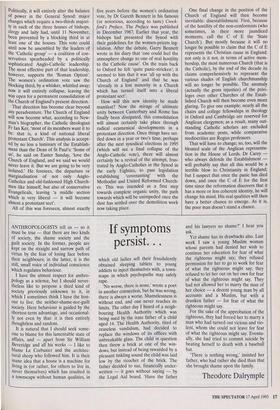If symptoms
persist.. .
ANTHROPOLOGISTS tell us — so it must be true — that there are two kinds of society, the shame society and the guilt society. In the former, people are kept on the straight and narrow path of virtue by the fear of losing face before their neighbours; in the latter, it is the still, small voice of individual conscience which regulates behaviour.
I have the utmost respect for anthro- pology as a science, but I should never- theless like to propose a third kind of society previously unknown to it, in which I sometimes think I have the hon- our to live: the neither-shame-nor-guilt society. Here behaviour is guided by the shortest-term advantage, and occasional- ly not even by that: it is then entirely thoughtless and random.
It is natural that I should seek some- one to blame for this lamentable state of affairs, and — apart from Sir William Beveridge and all his works — I like to blame Le Corbusier and the architec- tural sheep who followed him. It is their Inane idea that a house is a machine for living in (or rather, for others to live in, never themselves) which has resulted in a townscape without human qualities, in which old ladies sell their fraudulently obtained sleeping tablets to young addicts to inject themselves with, a town- scape in which psychopaths may safely rape. 'No worse, there is none,' wrote a poet in another connection, but he was wrong, there is always a worse. Shamelessness is without end, and one never reaches its limits. The other day I heard of a neigh- bouring Health Authority which was being sued by the irate father of a child aged 14. The Health Authority, tired of ceaseless vandalism, had decided to replace the windows of its offices with unbreakable glass. The child in question then threw a brick at one of the win- dows, but instead of being rewarded by a pleasant tinkling sound the child was laid low by the ricochet of the brick. The father decided to sue, financially under- written — it goes without saying — by the Legal Aid board. 'Have the father and his lawyers no shame?' I hear you ask.
Yet shame has its drawbacks also. Last week I saw a young Muslim woman whose parents had denied her wish to continue her education for fear of what the righteous might say; they refused permission for her to go to work for fear of what the righteous might say; they refused to let her out on her own for fear of what the righteous might say. They had not allowed her to marry the man of her choice — a decent young man by all accounts and a Muslim, but with a drunken father — for fear of what the righteous might say.
For the sake of the approbation of the righteous, they had forced her to marry a man who had turned out vicious and vio- lent, whom she could not leave for fear of what the righteous might say. Eventu- ally, she had tried to commit suicide by beating herself to death with a baseball bat.
`There is nothing wrong,' insisted her father, who had rather she died than that she brought shame upon the family.
Theodore Dalrymple


















































 Previous page
Previous page